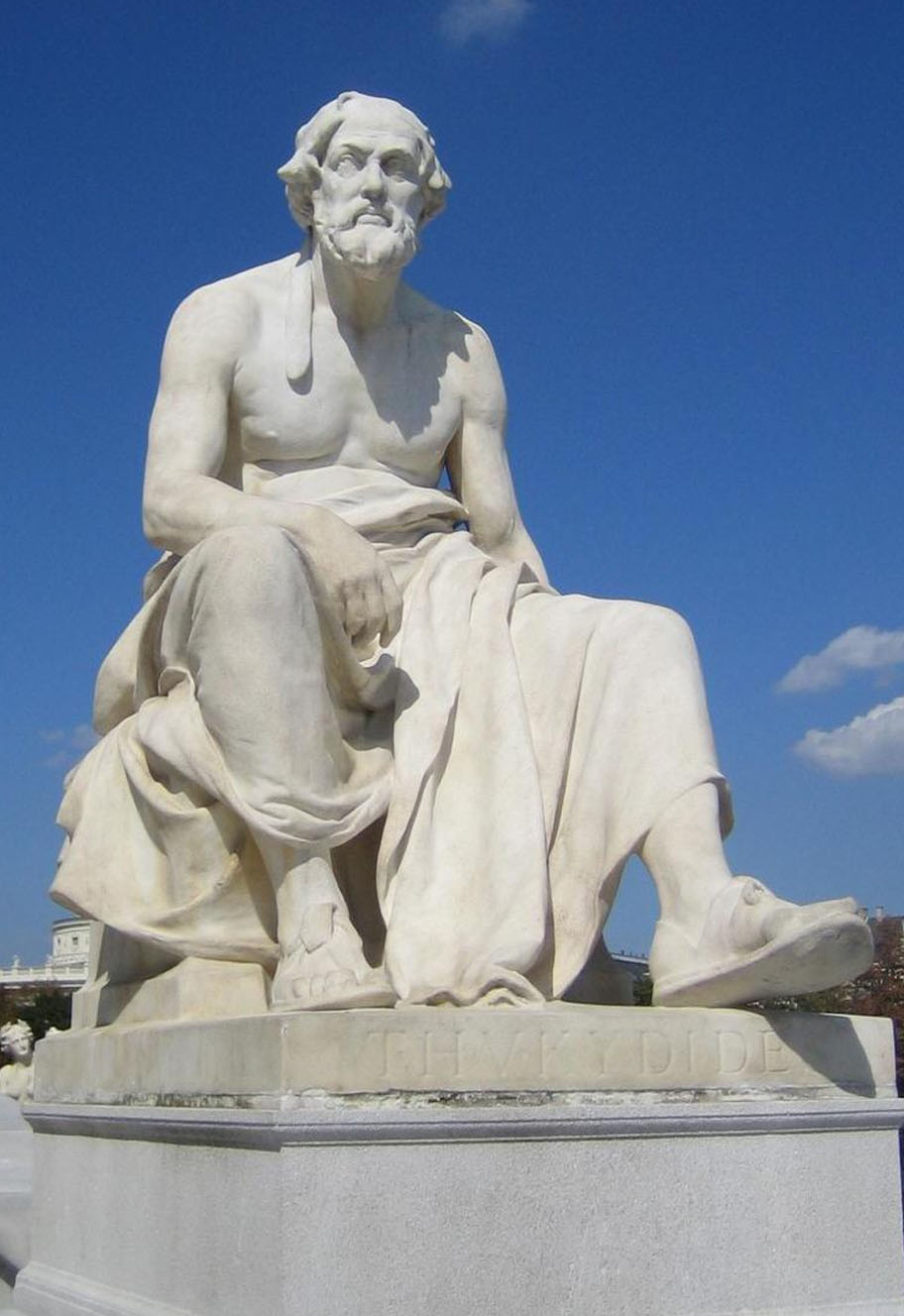Thucydides
Born:
C. 460 BCE
Died:
C. 395 BCE
Thucydides was an ancient Greek historian and one of the most important figures in the field of historiography. He is best known for his work "History of the Peloponnesian War," which chronicles the conflict between Athens and Sparta and their respective allies from 431 to 404 BCE. Thucydides is considered one of the founding figures of scientific history, as he sought to provide an accurate and rational account of historical events. Here are key aspects of Thucydides's life and contributions:
Background and Early Life: Thucydides was born into an aristocratic family in Athens around 460 BCE. Little is known about his early life, education, or personal experiences, but his aristocratic background likely provided him with opportunities for military and political service.
Peloponnesian War: Thucydides served as an Athenian general during the early years of the Peloponnesian War (431–404 BCE), a conflict between Athens and its Delian League allies against the Peloponnesian League led by Sparta. During the war, Thucydides was in command of a naval expedition to the Black Sea. However, he was later exiled from Athens, possibly due to a military failure, and spent part of his exile in the city of Thrace.
"History of the Peloponnesian War": Thucydides wrote his monumental work, "History of the Peloponnesian War," as a comprehensive account of the conflict. The work is unfinished and covers events up to 411 BCE. Thucydides sought to provide an accurate and impartial record of historical events, relying on eyewitness accounts and firsthand information whenever possible. His approach to history involved an analysis of the underlying political, social, and economic factors that influenced events. Thucydides focused on human behavior and the dynamics of power politics.
Scientific Approach to History: Thucydides is often credited with introducing a more scientific and analytical approach to historical writing. He sought to understand the causes and patterns of historical events, aiming for objectivity and eliminating mythological elements from his account. He emphasized the importance of factual accuracy and critical analysis of sources, distinguishing himself from earlier historians who often incorporated mythical and legendary elements into their narratives.
Absence of Authorial Presence: Unlike some historians who included their own perspectives and biases in their works, Thucydides adopted a more detached and impersonal style. His presence in the narrative is minimal, and he rarely expressed his own opinions or beliefs.
Speeches in the "History": Thucydides included a number of speeches in his work, which he crafted as if spoken by historical figures. These speeches are not verbatim records but rather literary compositions designed to convey the essence of what the speaker might have said.
Exile and Death: Thucydides likely returned to Athens after the city's defeat in the Peloponnesian War. The exact date and circumstances of his death are unclear, but he likely died around 395 BCE.
Legacy: Thucydides's "History" remains a classic in the field of historiography, admired for its analytical rigor, critical methodology, and the depth of its insights into the human condition. His emphasis on the study of power politics, the impact of human nature on historical events, and the careful examination of cause and effect has made his work a foundational text in the study of history.

Quick Facts
- Thucydides was born into an aristocratic family in Athens around 460 BCE.
- He served as an Athenian general during the Peloponnesian War and later faced exile, possibly due to a military failure.
- Thucydides wrote the "History of the Peloponnesian War," emphasizing a scientific and analytical approach to historical writing.
- His work is characterized by an absence of authorial presence, and he rarely expressed his own opinions or beliefs in the narrative.
- Thucydides's "History" remains a classic, influencing the study of history with its methodological rigor and intellectual depth.
Further Reading
Art &
Architecture
Ancient Greek art and architecture, with its harmonious proportions and timeless elegance, continue to inspire awe and admiration millennia later.
Discover
Greek Mythology & Mythical Characters
Greek mythology, a rich tapestry of gods, heroes, and mythical creatures, captivates the imagination with its tales of love, betrayal, and epic adventures that delve into the depths of the human psyche.
Discover
Ancient Greek History
Ancient Greek history, marked by remarkable achievements in democracy, philosophy, and warfare, shaped the foundation of Western civilization, leaving an indelible legacy of innovation and cultural influence that continues to resonate to this day.
Discover
Ancient Greek Olympics
The ancient Greek Olympics, held in Olympia every four years, celebrated athleticism, unity, and cultural pride, serving as a testament to the enduring spirit of competition and excellence that transcends time and borders.
Discover
Ancient Greek Wars
Ancient Greek wars, such as the Persian Wars and the Peloponnesian War, were pivotal conflicts that shaped the course of history, highlighting the struggle for power, independence, and the clash of civilizations in the ancient Mediterranean world.
Discover
Ancient Greek Culture and Society
Ancient Greek culture and society, characterized by its emphasis on art, philosophy, and civic engagement, fostered a vibrant intellectual and social landscape where innovation flourished, democracy thrived, and the pursuit of knowledge and excellence was celebrated as fundamental values of civilized life.
Discover